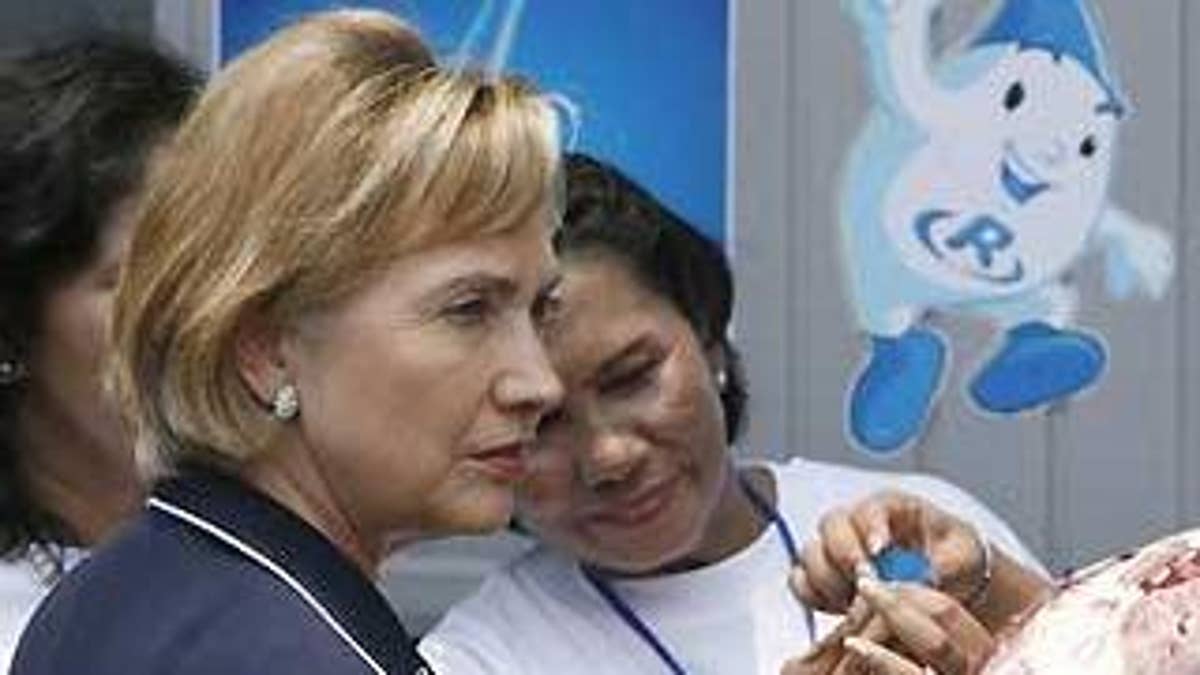
The Obama administration and America's Asian allies are preparing for a possible regime change in North Korea, Secretary of State Hillary Clinton said Thursday.
Speaking to reporters aboard her plane from Indonesia to South Korea, Clinton said "the whole leadership situation (in North Korea) is somewhat unclear." She said the difficulties of dealing with the Stalinist regime of Kim Jong Il -- who is believed to have suffered a stroke last year -- have been compounded by "the uncertainties that come from questions about potential succession."
She said the administration and its allies in the East are studying the scenarios surrounding such a succession of power.
"If there is a succession -- even if it is a peaceful succession -- you know, that creates more uncertainty," Clinton said. "It also may encourage behaviors that are even more provocative, as a way to consolidate power within the society. So we will spend a lot of time -- I will -- trying to determine from the South Koreans and the Chinese what their information is, because obviously they have a lot of sources they can share with us."
Clinton's stop in Seoul, the third in her week-long tour of Asian capitals, comes amid increasing tensions between the two Koreas. The North recently suspended its compliance with all treaties it has signed with the democratic South, and threatened over the last week to test-launch a long-range ballistic missile during Clinton's visit to the region. She called the potential launch "of great concern" and urged South Korean leaders not to "take the bait" in response to the North's bellicose statements.
One of Clinton's chief aims this week is to reinvigorate the stalled Six-Party talks aimed at persuading Pyongyang to dismantle its nuclear programs. The North detonated a low-yield nuclear device in October 2006. That device, and the arsenal of six to 10 nuclear bombs the North is believed to possess, was developed through the reprocessing of plutonium. Since 2002, U.S. officials have alluded to classified intelligence suggesting Pyongyang has also been operating a clandestine highly-enriched uranium (HEU) program, an allegation the North denies.
In contrast with the Bush administration -- which cited the evidence of HEU activity as the basis for scuttling earlier nuclear accords with North Korea -- Clinton on this trip has repeatedly cast doubt on whether the HEU program exists. She has urged those focused on it to remember that it was the reprocessing of plutonium that enabled the North to become a nuclear state.
Asked Thursday about recent reports in South Korean media alleging the existence of an underground HEU facility near Yongbyon, Clinton acknowledged the allegations as "a matter of ongoing concern."
But she added: "I mean, let's focus on what (the North Koreans) have done, and how much easier it is to reprocess plutonium. Obviously, we're concerned (about HEU), and as we move forward in the Six-Party talks, if we we're ever at the point where we could create a complete and verifiable agreement, it would clearly include highly-enriched uranium. And the inspectors and the other means for testing would be charged with determining what, if anything, did exist."
While in Seoul, Clinton will confer with U.S. and South Korean military officials about the ongoing redeployment of the roughly 37,000 U.S. forces stationed in the region, and is also slated to conduct a town hall meeting at a women's university. She heads next to China.
At each of her stops so far, in Japan and Indonesia, Clinton has juggled a heavy schedule, meeting with government ministers, heads of state, civil society workers and young people. She conducted a spirited town hall at Tokyo University and in Jakarta toured a teeming inner-city neighborhood that has benefited from American-funded clean water projects.
In a roundtable interview Thursday morning with seven young Indonesian journalists, all of whom received grants last year to cover the U.S. presidential campaign, Clinton made her most extensive remarks yet on her decision to join the so-called "team of rivals" in the Obama Cabinet.
"I've been asked several times by Indonesians just in the last day how I could work for President Obama after I ran against him," Clinton said. "And it's because in our country, in our democracy, we try after we have elections to come together ... I was, you know, very honored and surprised when he asked me to be the secretary of state."
She said she expected to go back to being a senator, "But President Obama was very persuasive in our conversations when he did ask me ... I had to make a very hard decision."
"But I believe strongly in supporting my country, and serving my country, and this was another way to continue to do that ... Now if I totally disagreed, that would be hard. But I don't. I agree with what we're trying to accomplish," she said.
Asked at that point how she has "survived" three decades in the political spotlight, the former first lady, senator and presidential candidate quipped: "Well, you have to have a high threshold for pain, number one." When an Indonesian journalist wondered what Clinton would do if she "lost everything," she smiled and said: "I don't think about that!"




